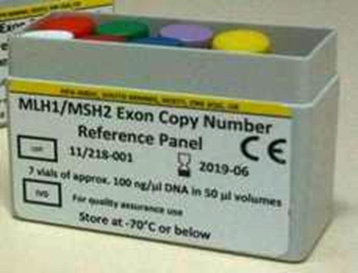HNPCC/Lynch Syndrome
We have recently removed MLH1/MSH2 Exon Copy Number Reference Panel (code 11/218) from the catalogue. It will be available again in the future in the form of Reference material (NOT IVD/CE-marked).To enquire about this material, please email grmteam@nibsc.org.
Hereditary nonpolyposis colorectal cancer (HNPCC; Lynch syndrome) accounts for more than 1% of colorectal cancers, with prevalence in the order of 1:3000. It is known to be caused by defects in one of several DNA mismatch repair genes: MSH2, MSH6, PMS1, MLH1, MSH3, and PMS2. Awareness of the inherited predisposition is key to survival; the familial nature of the disease makes it important for relatives of affected individuals to be diagnosed. Most mutations causing HNPCC are point mutations or small insertions or deletions; these are easily detected by mutation detection methods or DNA sequencing. However, a significant percentage of the HNPCC-associated mutations are deletions/duplications of one or more exons in MLH1 and MSH2. Mutations in which whole exons are deleted or duplicated are more difficult to detect and appropriate technology has only recently become available, including multiplex ligation-dependent probe amplification (MLPA). MLPA is a multiplex PCR method which simultaneously detects copy number changes across multiple DNA sequences within one sample.
In any genetic diagnostic laboratory, it is necessary that HNPCC genotyping assays are robust and controlled. Both positive and negative controls should be included to demonstrate the performance of the assay and the absence of contamination, respectively.
MLH1/MSH2 Exon Copy Number Reference Panel
The MLH1/MSH2 Exon Copy Number Reference Panel is intended as single-use controls in diagnostic DNA-based HNPCC genotyping using MLPA technology for MLH1 and MSH2. . The panel may also be used in a non-diagnostic manner to assist the validation of NGS assays involving copy-number determination. Mutations in other HNPCC-associated genes are not represented; not all common mutations in MLH1 and MSH2 may be represented.
 The panel is classified as an IVD which is suitable for in vitro use in Europe; available for research-use worldwide. The materials are intended to act as a test of assay function, for validating diagnostics.
The panel is classified as an IVD which is suitable for in vitro use in Europe; available for research-use worldwide. The materials are intended to act as a test of assay function, for validating diagnostics.
We are not aware of any other certified genomic reference materials available for the genotyping of mutations in MLH1 or MSH2.
The panel comprises seven liquid human genomic DNA materials derived from cell lines (Table below), providing controls for mutations in MLH1 and MSH2. Each panel contains genomic DNA materials in screw-capped 0.5 ml tubes at approximate concentration 100 ng/µl in approximate 50 µl volumes. The panel requires storage at -70oC or below.
The MLH1/MSH2 Exon Copy Number Reference Panel:
Tube | Lid Colour | Genotype |
|---|
1 | Orange | MLH1 exon 4 c.350C>T (p.Thr117Met) and MLH1 exon 16 [c.1852A>G; c.1853A>C] (p.Lys618Ala), heterozygous |
2 | Green | MSH2 intron 5 c.942+3A>T, heterozygous |
3 | Purple | MSH2 deletion exons 1-6, heterozygous |
4 | Yellow | MSH2 deletion exon 7, heterozygous |
| 5 | White | MSH2 deletion exons 1-2, heterozygous |
| 6 | Red | MSH2 deletion exon 1, heterozygous |
| 7 | Blue | MLH1 exon 13 amplification (three or more copies) |
Tubes 1 and 2 contain point mutations associated with HNPCC; these would not typically be detected in MLPA and thus serve primarily as negative controls for this technology, but also as positive controls for the direct sequencing typically performed in the absence of a positive result for MLPA. Tubes 3-7 contain a deletion or amplification of different exons of the two genes, thus providing a range of positive controls for MLPA.
The panel has been tested for use by external laboratories to show suitability as control materials by giving satisfactory results when tested in MLPA-based genotyping of MLH1 and MSH2. Mutations were confirmed by direct sequencing and MLPA-based genotyping of MLH1 and MSH2.
How to order
To place an order please login to your account or sign up for a new account.
For scientific enquiries contact the team at grmteam@nibsc.org.